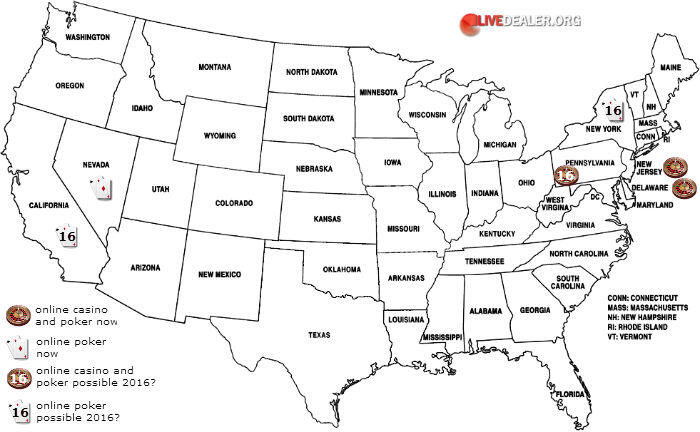Current state of play in legalized US online gambling
Hot on the heals of the US Department of Justice’s revised iGaming stance, New Jersey and Delaware became the first two US states to go live with locally licensed intrastate online gambling.
That was back in November 2013. Nevada followed shortly afterward with online poker licenses and there was an expectation from many commentators that a flood of other US states would soon follow suit.
Dam walls still holding strong
Two years on there are still only three US states where residents are able to play at locally regulated online casinos.
The other states’ enthusiasm to join the revolution seems to have been curbed by the underwhelming performance of the three guinea pigs and the threat of Sheldon Adelson eventually getting RAWA over the line.
The New Jersey government projected their new online gambling industry would generate about $1 billion in its first full year. It did just over 10% of that. The story in Delaware and Nevada was similarly underwhelming, sending a message to other state legislatures that online gambling taxes aren’t necessarily the budget saviour they were looking for.
Then there’s RAWA which refuses to go away. It’s yet to show any real likelihood of becoming law, but with some political support and Adelson’s financial clout behind it, this is not an impossibility. As long as it is hanging around the possibility of a federal prohibition remains, and this continues to spook state legislatures from moving forward with their own laws. You can track RAWA’s progress here.
State by state: who’s most likely to go online next
In 2015 seven states introduced bills aimed at legalizing online gaming: California, Illinois, Massachusetts, Mississippi, New York, Pennsylvania and Washington. Of these, the consensus from analysts seems to be that Pennsylvania, California and New York are likely to move the fastest. But we’re talking legislature speed, not light speed. New Jersey, Delaware and Nevada could well be standing alone at the end of 2016 still!
Regardless, below is a brief overview of where these other states currently stand.

Pennsylvania’s online gambling bill, HB649, was introduced in February this year and was just last month approved by the House of Representatives Gaming Oversight Committee. Passage through the House and then the Senate are still required before Governor Tome Wolf (a supporter of the bill) can sign it into law. But at least concrete progress has been made with this one.
The bill is being championed by state representative John Payne who is pushing for gambling reform, and it has the support of 11 out of the state’s 12 local casinos. Pennsylvania has clear intent to move forward in this area, having taken the unusual step of introducing a resolution urging Congress to defeat bills aimed at prohibiting internet gambling (ie RAWA). HB649, if passed would allow for locally licensed interactive poker and casino games.
Just to keep things interesting, Pennsylvania is also considering legislation (HB1013) to prohibit online gaming in their state. Democratic process at work!
California saw multiple, competing online poker bills introduced to their legislature during the year. None managed to progress very far but none are dead either. California remains the ‘next year‘ state.
New York State Senator John Bonacic introduced S5302 in May this year. The bill seeks to legalize intrastate online poker setting out licensing stipulations, tax requirements and authorised games. It was not considered by the legislature this year, but is expected to looked at in 2016.
The bill contains a couple of interesting provisions. The first is the removal (from a similar 2014 bill introduced by Bonacic) of a so called, ‘bad actor clause’. The intent of such a clause is to prohibit operators who accepted bets from New York State residents during the UIGEA years from obtaining a license. Removal of this clause opens the door to these operators.
The second is the bill’s preamble which proposes amending the definition of a game of chance to include,
“any contest, game, gaming scheme or gaming device in which the outcome depends [in a material degree] PREDOMINANTLY upon an element of chance, notwithstanding that skill of the contestants may also be a factor therein.”
It is speculated that this changed language could open the door to legalized casino games down the track. Plenty of water to flow under the bridge before then however.
You can track the progress of S5302 here.
In Washington hopes of licensed online poker in 2015 or beyond were dashed pretty early in the year when HB 1114, a bill sponsored by Rep. Appleton fizzled. In Appleton’s words:
“The bill did not get the support that I had originally hoped for and consequently we will not be moving forward with it this session.”
In Mississippi iGaming bills died in committee, while in Massachusetts and Illinois nothing happened to get overly excited about.



Things are (slowly) on the improve in New Jersey. They just posted a record revenue month for November 2015…$13.2 million, 11 month YTD revenues to $134.8 million – 20% up on the same time last year.
2015 could be a $150 million year. 15% of initial annual projections and closing!